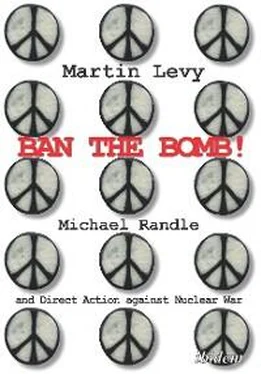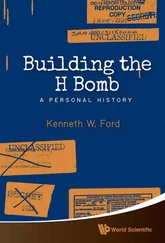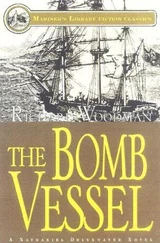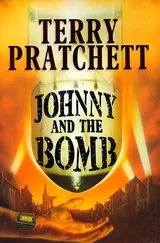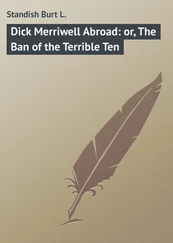I’d forgotten just how much influence he had upon me.
For instance, in the application you raise some of the common objections to pacifism, and then you dismiss them using Huxley’s arguments. I also have a further observation: the nuclear issue is hardly mentioned. There’s a line, but that’s about it. It doesn’t seem to have been much on your mind, which isn’t the impression I get from some of your later writings.
That’s interesting. You know, when I did the first draft of the application, I didn’t take a completely pacifist point of view. As I said earlier, I said then that nuclear weapons were indiscriminate and that it was on those grounds that I wasn’t prepared to be part of the military. But then I read Huxley and was influenced by Dr Kerr, so I went down the completely pacifist route. And then I also discovered Gandhi, though without learning much about the whole history of what he had been doing. I had, I think, a rather simplified view of how Gandhi had operated. But yes, your observation is interesting, the fact that I hadn’t emphasised the nuclear issue.
One, I think, very valid point you make, again it’s very Huxleyan, is about the connection between ends and means. You use the example of the Russian Revolution.
Well, Catholic teaching insists that the ends do not justify the means. I concluded from that that killing even for a just cause was wrong. Huxley I think goes further and concludes that the means determine the ends. For instance, if you use lethal violence to achieve a revolution the result will be a violent and unjust society. As another writer on non-violence and revolution, Bart de Ligt, puts it, ‘The more violence, the less revolution.’
By the way, on the subject of communism were you drawn to any of its variants?
Certainly not to any of the authoritarian forms. The idea of equality did appeal to me. But the top-down, Stalinist, style of leadership? No, I’ve always hated that.
Would that have had anything to do with reading Orwell, say, his Nineteen Eighty-Four , for instance?
It may have done. I did read Nineteen Eighty-Four and Animal Farm, but I can’t remember at what age exactly . Nineteen Eighty-Four had a big influence on me when I did read it, but that may have been a bit later, probably sometime in the late fifties.
What about one of the other very influential anti-communist books of the period, The God that Failed , with the striking essays by Koestler and others?
Yes, that had a profound impact upon me. I forget which of the essays it was. It may have been the one by Gide or Spender. But it contained an account of one of the great leader’s speeches. Apparently, everyone had to clap. And they were frightened of what could happen to them if they were among the first to stop clapping. And then there was another thing that stayed with me from that book—this one may have been in the essay by Koestler. Anyway, it described a meeting somewhere where people were discussing policy, and an English communist said, ‘We can’t say that. It would be a lie.’ And they all burst out in cynical laughter, as if to say, what’s the problem with that?
Following your application for C.O. status you were interviewed at Fulham, in March 1952. You appeared before a certain Sir G.P. Hargreaves. and one or two others, including the Reverend Professor Edwin O. James. They sound like a pretty formidable bunch.
I don’t remember feeling particularly nervous. I was so definite about it all. But I do remember that they asked me about my qualifications, and it came out that I had a distinction in School Certificate English. One of them said, ‘So that’s what this is about!’, meaning that’s what had fed into my lengthy statement as to why I was a conscientious objector. My mother gave evidence in support of me. She told them how I’d lain awake night after night, thinking about it all. And that probably had an effect as well. Anyway, my application was accepted.
Now, Michael, by this time the family had moved out of Cheam to a much larger house in Reigate. Tell me a bit about that if you would.
The house we moved to was called Little Gatton and, you’re right, it was in Reigate, which was about ten miles further south, not far from the Surrey Hills and Betchworth. It was quite an interesting building. This wasn’t because it was an old historic building; I think it was built in the thirties. It was interesting because of the people who’d lived there: first, the author Sax Rohmer, creator of the wicked Dr Fu Manchu, and then Sir Malcolm Campbell, the famous racing driver. My father bought it from Sir Malcolm’s estate—Sir Malcolm, I believe had died there. That said, I didn’t give two hoots about that aspect. From my point of view, it was simply a nice house. One of the reasons why my father was attracted to it was that there was a small farm attached to it. You see, the farming bug hadn’t left him.
And what about you? Were you interested in farming too?
Oh, yes. I really took to it. I started making compost heaps and so on. I remember we had three cows, which I hand-milked. I can still do that by the way. So, come the nuclear holocaust I might well be self-sufficient [laughs].
How was the farm run? On idealistic lines?
Not in the least as far as my father was concerned; it simply tied in with his lifelong interest in the land and in growing things. After all, he was still a businessman. Indeed, when he bought a 200-acre farm in Sussex in 1953, like a lot of farmers at that period he grubbed up most of the hedgerows to make what he called his prairies. I’m pleased to say my brother, John, put them back in again.
I might also add that he was quite keen for me to take over the farm. So, I suppose that had it not been for Peace News and the whole direct action thing, that’s where I would have ended up, as a farmer I mean!
I suppose you still discussed politics with your father.
Yes, I did. We particularly discussed war and peace issues. He was still a decided pacifist, which was a bit of a contradiction in a way with his conservatism. But then, as I said before, he was a pacifist on moral grounds. Of course, at Douai I’d been taught the just war approach to international relations. But he’d have none of that: all wars were wrong and that was simply the end of the matter. Then I suppose that like most of us he’d been brought up to believe that lying was a sin and that warfare involved spying, and therefore deception and lying. He used to ask me, ‘How can you justify all of that?’ In fact, he hated every form of violence.
You never saw him lose his temper then?
Oh, Jesus. Of course, I did. On one occasion when we were still living in Burdon Lane he ripped up all the flowers in the front garden because he thought that one of the priests was having an affair with my mother, which was the last thing that would have happened. And then I remember another occasion: he got himself into such a rage that my mum actually left and spent the night with one of our Irish friends in the area.
But I don’t want to end on a negative note regarding my relationship with my dad. I was hugely influenced by him, not only on the issue of peace and conscientious objection, but on a range of issues and interests. It was from him that I imbibed a love of classical music, and of J.S. Bach in particular. Dad was an excellent pianist and spent many hours at a time playing and practicing Bach’s preludes and fugues. He said that it was his ambition to be able to play all forty-eight of them before he died. Well, he didn’t quite manage that. But he had quite a few of them under his belt by the end, though in later years when his health was failing, he wasn’t able to play as much.
Читать дальше
